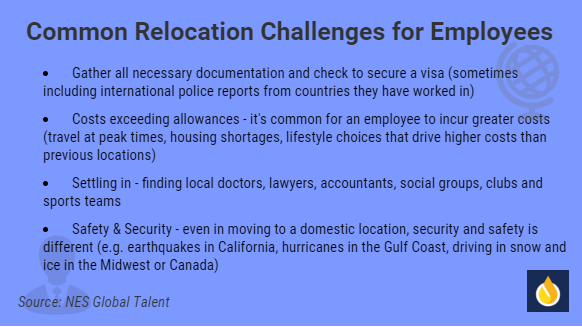Oil and gas is a global industry in which commodity prices have distinct and significant economic impacts across the world. As such, professionals who work in oil and gas are typically accustomed to global operations and at times, this requires work relocations – both domestically and internationally.
It’s always great for both employer and employee when relocations go smoothly, but the reality is … sometimes they don’t.
Ryan Jotta, who works in oil and gas recruiting, once had a not-so-successful relocation experience. His company attempted to relocate him from Australia to a position in Manchester, England. However, he was declined entry and sent back home to Australia because he didn’t have a working visa. He was banned from the UK for two years.
“The company I was working for didn’t arrange a visa for me and advised it would be fine for me to enter Manchester,” Jotta told Rigzone. “Being naïve and eager to travel and work, I went anyway.”
As immigration is becoming more complex for employers and employees to navigate, the relocation process needs to be looked at carefully.
“There are often multiple visa types and the process for securing the visa now requires much more documentation and examination, both on the part of the employee and the employer sponsor,” Dane Groeneveld, managing director for the Americas, NES Global Talent, told Rigzone. “Even when an individual is conducting work periodically in a country, there has been a large shift away from relying on short-term tourist or business travel visa programs, so the safest assumption is that if work is going to be done, a work permit and/or visa should be acquired in the absence of clear direction that this is not required.”

NES Global Talent, which recruits talent for the oil and gas industry, has more than 6,000 people on assignment around the globe. The company is often requested to support short-term (four to 12 weeks), medium-term (three to 18 months) and long-term (18 months and longer) relocations domestically and internationally.
Groeneveld said the company has specialist global mobility teams within regional business units who work closely with authorities and service providers to stay current on changing legislation and practices in each location workers are sent.
“This allows us very early on in the recruiting cycle to determine which candidates are more likely to be able to secure the necessary work permits or visas, and to manage the process through to deployment so we meet operational objectives and support the employee to enjoy a seamless transition.”
Employee Due Diligence
Mike Morse, a near 30-year industry veteran, has worked in roles including technical sales and operations in wellbore construction disciplines. And he’s relocated about 15 times, varying in length from three months to four years.
Some relocation challenges he’s encountered have included receiving little to no information on his new location, language barriers and school issues for his children.
In the case of any relocation, employees would be advantageous in researching as much as they can about their new location and all the factors surrounding the move – everything from the actual job site to the area schools.
Groeneveld said while the responsibility typically falls on the employee to research new locations, NES Global Talent can provide support that includes:
- Provision of location/country guides
- Organized site visits
- Cultural awareness seminars
- Relocation coordinators to support with setting up local accommodation, schooling, financial institutions, medical providers
- Meet-and-greet services on arrival at the new work location
“The larger the language barrier, the more coordinated the support service for the relocation needs to be,” said Groeneveld.
This can extend to providing accelerated language programs prior to deployment as well as providing employee and dependents with ongoing language classes on the work site or in the local community after deployment. Some countries even allow for a driver or similar service to help the employee navigate language and cultural gaps.

Differences Among Blue Collar, White Collar and C-Suite
Groeneveld described the types of relocation packages typical for certain groups of workers, which can vary.
Blue collar workers (typically hourly employees who perform manual work) who are indefinite period direct hires usually receive:
- Travel to work location for family
- Expenses reimbursed for shipping personal items
- Interim accommodation (two to four weeks)
- Hire vehicle (two to four weeks)
Blue collar workers on short-term assignments or project hires usually receive:
- Mobilization allowance or mileage to get to the location
- Depending on mobilization allowance, there may be interim accommodation or a site allowance paid per day worked
- Per diem in accordance with local legislation
White collar workers (typically salaried employees who work in an office) generally receive an enhanced version of the blue collar workers – longer periods of benefit provision (three to six months interim accommodation) as well as higher likelihood that the company organizes much of the shipping and travel directly.
With international relocations, some families receive support toward school fees and enhanced employee benefits.
“Before the downturn in the market, it was also quite common for the employer to pay the costs of closing or realtor fees on housing transactions resulting from the relocation,” Groeneveld said.
For C-suite and senior level executives of an organization, relocation packages tend to be much more comprehensive, in which housing can at times be provided for the entire duration of employment in the new location or larger cash values can be provided for each component of the package. Additionally, it’s more common for these employees to receive annual allowances for travel back to their home destination.
While it’s not a given that all oil and gas workers will experience a relocation during their career, it’s good to remain open to the possibility, especially considering the industry’s current climate.
“It’s a really tough market out there. There are plenty of jobs coming up, but they will often be in remote locations or areas where there is not an abundance of local talent,” Groeneveld said. “Taking time to travel early when joining the industry is going to increase both the chances of securing a role and also the speed of career development – largely because roles in destinations that face talent shortages often require an individual to grow more quickly and become exposed to a wider variety of duties and challenges.”
Still, workers need to be committed to a relocation.
“Employees need to ensure that the work location or environment is going to meet their family requirements, as failure to complete a job assignment early in their career – due to not settling in a location – can create problems getting a good reference and may negatively impact future employment potential in this industry.”
source? http://www.rigzone.com/news/oil_gas/a/149016/How_to_Combat_Oil_Gas_Relocation_Challenges/?pgNum=1
